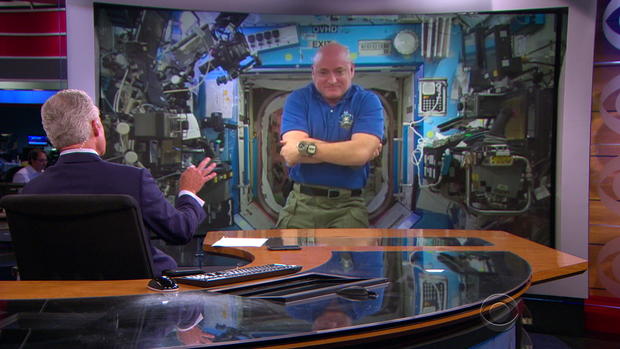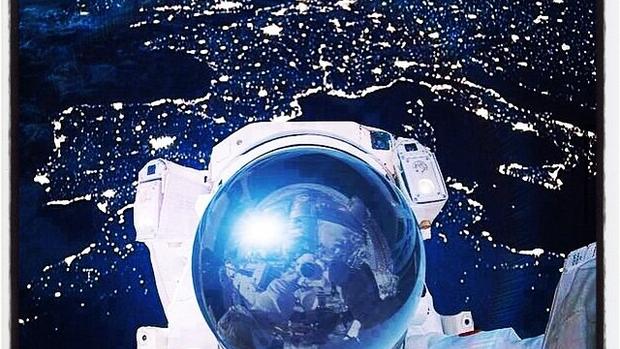NASA astronaut Scott Kelly on life aboard the space station
Three months into a nearly yearlong stay aboard the International Space Station, astronaut Scott Kelly said Tuesday he feels fine, mentally and physically, telling CBS News he doesn't expect any long-term problems reaching the end of his marathon mission.
Despite the noticeable lack of weather, the extended confinement in a relatively small volume, the constant noise of fans and pumps and a unique, occasionally "antiseptic" smell mixed with a faint trace of garbage, life aboard the space station is generally comfortable and rewarding given the value of the crew's research.
Speaking with "CBS Evening News" anchor and managing editor Scott Pelley, Kelly began by joking that "every time I hear your name on '60 Minutes' I turn around and it sounds like someone's calling my name." Pelley said he would gladly "trade a consonant to trade places with you."
Turning to the crew's medical research, Kelly said the experiments he and fellow yearlong crew member Mikhail Kornienko are participating in could be critical for eventual flights to deep space destinations like Mars.
A major concern, Kelly said, is evidence that some astronauts on long-duration missions suffer vision problems, apparently caused by the absence of gravity and fluid shifts toward the upper body that increase pressure in the head, putting stress on the crew members' optic nerves.
"You wouldn't want some astronauts to get on Mars after a year and a half, or longer when they're coming home, and not be able to see," Kelly said. "It's something we don't understand, but it's something we're working hard at understanding and mitigating the effects. We've done a lot of research up here since I've been here to better understand that."
The more commonly known issues of bone and muscle loss can be mitigated by exercise and diet, he added, but the effects of space radiation are another major question mark for long-duration flights.
Kelly and his twin brother Mark, a retired space shuttle commander, are participating in several studies to learn more about the effects of the space environment at the genetic level by comparing the Earth-bound twin with his space-faring brother.
"We are very similar genetically, not 100 percent the same but 99.9 percent or something close to that, similar or identical with regards to our DNA, our RNA, proteins," Kelly said. "Now, those things manifest themselves differently in individuals based on various factors including our environment. But the two of us are as close as you can get with people that have flown in space.
"There are a lot of factors here that can affect us on a genetic scale, for instance the radiation or even the microgravity environment. So having my brother as a control subject, someone that NASA has studied for a long time ... it's a perfect opportunity to see how we change on a genetic basis over the course of the year I'm going to be here."
Pelley asked Kelly to describe life aboard the station, from the way it smells to the ever present sounds, wondering if the confinement is similar to what inmates experience in jail.
Kelly struggled to describe the smell, saying it's a bit different in different locations but finally concluding it occasionally has an "antiseptic" quality "combined with, like, garbage. But it doesn't really smell bad."
"Now space has its own unique smell," he said. "So whenever a vehicle docks or if guys are out doing a spacewalk, the smell of space when you open up the hatch is very distinct. It's kind of like a burning-metal smell, if you can imagine what that would smell like. And as far as the sounds on the space station, it's pumps, fans, motors, certain modules are louder than others, but it's generally a pretty nice working environment. It's not too loud or too smelly."
As for the confinement, Kelly said it's probably similar to being in jail in that "you can't leave, no matter what happens, you're not going home. We don't get to go outside, so that's a little bit different. I would imagine in a lot of jails people get fresh air. You don't get that here. And you don't get real sunlight. ... The big difference, though, is we're here by choice. So that makes, I guess, the situation a little bit better."
Along with the physical demands of living in weightlessness and the requirement for two hours of exercise a day, the yearlong mission also features research to help monitor the psychological well being of Kelly and Kornienko. So far, Kelly said, no major problems have developed.
"I've been up here for almost 90 days, and I've got about 250 to go or something like that," he told Pelley. "And it seems like I've been up here for a long time already. But the psychological effects is one of the reasons we're doing this, to better understand that."
So far, he said, based on "where I am at this point, I'm not going to have any major issues with it, but I'm very conscious of the fact that I have to manage my fatigue level, and rest when I have time to rest, and exercise, and do all those things that can help me get to the end of this with the amount of energy and attention to detail and enthusiasm I had at the beginning."
"But certainly, it's one of the reasons we're doing this. If we're going to go farther from Earth, to Mars or somewhere else someday, we have to have a good understanding of the psychological impact on people. And not only psychologically, but how it affects their cognition. We're doing a lot of research on my cognitive abilities."
Kelly's brother Mark is participating in the same tests, "although my cognition, I think, is generally better than his," Kelly joked. "But all of those factors are one of the reasons why we're doing this."


